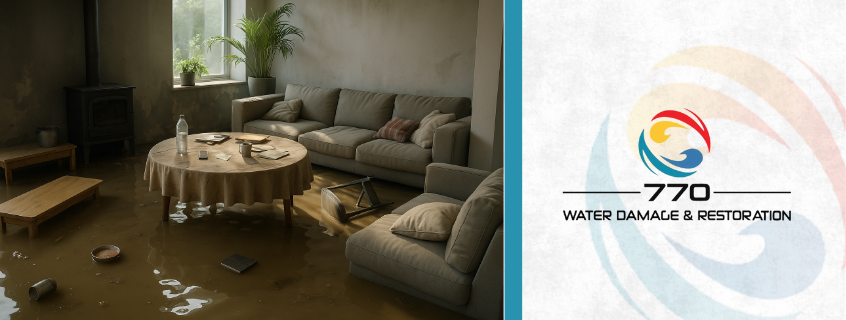
Imagine walking into your home, opening the closet to grab a jacket, and suddenly—you notice a strange, musty smell coming from the corners. It’s not garbage. It’s not dirty laundry. It’s a smell that reminds you of wet soil or a damp forest floor. If your closet corners smell earthy, that seemingly small detail might be trying to tell you something big. Let’s explore why this happens, what it means, and how to fix it—before the scent becomes a serious problem.
What That Smell Really Means
When the closet corners smell earthy, most homeowners don’t realize it’s a red flag. This isn’t just a weird odor; it’s often a hint that there’s excess moisture somewhere in the closet. Moisture leads to mold. Mold can mean damage. And that damage? It often hides behind your walls, in the ceiling, or even beneath the floorboards. That earthy scent comes from microbial growth—tiny fungi like mold or mildew—that thrive in damp, dark corners.
Tracing the Source: Why Moisture Loves Closets
What causes that moisture in the first place? There are several reasons:
- Leaky pipes behind the wall
- Poor closet ventilation
- Water intrusion from the roof or nearby rooms
- Humidity trapped in tightly packed spaces
The scent might feel subtle at first. But the truth is, once the closet corners smell earthy, you’re already past the early warning signs. The microorganisms causing the smell have begun growing, and they’re now spreading their spores in the air you breathe. That can lead to itchy eyes, coughing, sneezing—or worse, for those with asthma or allergies.
It’s Not Just Dust: Common Odor Culprits
Let’s look at the most common culprits behind earthy-smelling closet corners. First, there’s mold and mildew. They love moist wood, drywall, and fabric. Second, there’s wet insulation—often unseen, sitting behind the wall, slowly rotting. Third, hidden leaks—like from an upstairs bathroom or an old water heater—can find their way down, settling into closet spaces below. When closet corners smell earthy, it’s not just about surface dust. It could be a deeper issue needing attention.
Building Materials That Make Things Worse
Now here’s something most people overlook: your closet’s construction materials play a big role. Did you know that certain types of wood panels and drywall are more prone to moisture absorption than others? That means not all walls are created equal. If your home has older wood paneling or porous drywall, and the closet corners smell earthy, you might be looking at the early stages of structural degradation.
Material Moisture Comparison Table
| Wall Panel Type | Moisture Resistance | Odor Retention | Mold Growth Risk |
| Plywood Panels | Moderate | High | High |
| MDF (Medium-Density Fiberboard) | Low | Very High | Very High |
| Solid Hardwood Panels | High | Moderate | Medium |
| Composite Panels | Moderate | Low | Low |
| Vinyl-Coated Panels | Very High | Low | Very Low |
If your home has fiberboard or unsealed plywood, the odds are high that once your closet corners smell earthy, you’ve got moisture clinging inside those wall layers.
Airflow: The Silent Saboteur
There’s another invisible factor: airflow. Airflow matters more than people think. Closets are often tight, with closed doors and packed shelves. That traps humidity, especially if the door is kept shut often. Even a small rise in moisture levels can turn those back corners into a breeding ground for mildew. A few degrees difference in humidity may seem minor—but for mold, it’s the perfect storm.
Hidden Clues: How to Know It’s Serious
Here’s a quick checklist to help you understand whether you’re dealing with something serious:
- Does the odor get stronger after rain?
- Is the scent more noticeable near the baseboards or ceiling line?
- Do your clothes feel slightly damp?
- Is there any visible discoloration on walls or floor corners?
If you answered yes to more than one of these, your closet corners smell earthy because there’s likely hidden water or mold present.
Surface Clues That Tell a Bigger Story
Some signs don’t seem connected but actually are. For example:
- Bubbling paint
- Peeling wallpaper
- Warping wood
- Squeaky floors
These things might seem minor, but together with that earthy closet odor, they point toward one root problem: moisture intrusion. And when moisture sticks around for too long, it’s not just the closet in trouble—it’s your entire wall system. That’s when you may need more than a surface cleaning.
Why DIY Isn’t Enough
You might wonder: “Can I just spray some air freshener or open a window?” The truth is, masking the odor only delays the problem. To solve it fully, you need to figure out where the water is coming from. That could mean checking pipes, roof lines, attic insulation, or even inspecting the foundation. If your closet corners smell earthy, think of it as nature’s smoke alarm—telling you something’s smoldering under the surface.
Mold Hides Better Than You Think
There’s a good reason professional restorers exist. When homeowners try to fix moisture issues themselves, they often miss the mold that hides behind the scenes. Mold spores are microscopic. They can hide in:
- Insulation
- Behind baseboards
- Beneath carpet pads
- Inside wall cavities
And once they’ve spread, the cleanup becomes more expensive and more dangerous. If you ever notice discoloration or water stains along your closet’s edge and the closet corners smell earthy, it’s time to stop guessing and start investigating.
What to Do About It: A Step-by-Step Guide
Step-by-Step Guide to Tackle Earthy Closet Odors
- Empty the Closet Completely
Remove clothes, shoes, boxes—everything. This allows airflow and helps you inspect walls and floors better. - Inspect for Visible Mold or Water Marks
Look for gray, green, or black patches. Feel walls for coolness or softness, which may indicate moisture inside. - Use a Moisture Meter
Inexpensive tools at hardware stores can detect moisture inside walls without tearing anything down. - Ventilate the Space
Set up a small fan or dehumidifier. Run it for 24–48 hours to dry out the space. - Deep Clean Walls and Corners
Use a mixture of white vinegar and water or a mold-killing solution. Scrub thoroughly. - Check Adjacent Rooms
Sometimes, water seeps in from nearby bathrooms, kitchens, or attics. Expand your inspection area. - Monitor Over Time
If the closet corners smell earthy again after cleaning, it’s time to consult a specialist.
When to Call for Help
If the smell returns quickly, or if your cleaning seems to make it worse, this might be a sign that moisture has been trapped inside structural materials. When that happens, drying the surface won’t help anymore. That’s when professional water damage services become essential.
If you’re unsure whether to call someone, here’s when it’s best to seek help:
- You notice spreading discoloration on drywall
- The odor worsens instead of fading
- You’ve had past plumbing or roof leaks
- There’s a health change in family members—like sneezing or headaches
Sometimes, what looks like a minor scent issue is a structural emergency waiting to happen. For urgent situations like hidden wall moisture or mold growth in enclosed spaces, expert cleanup crews can handle what household tools can’t.
Preventing the Return of the Smell
Preventing future issues is all about airflow and materials. Keep closet doors slightly ajar when possible. Use moisture-absorbing products like silica packs or baking soda bowls. Swap out overly absorbent storage containers with plastic bins. If your closet corners smell earthy, prevention should always come after remediation—not instead of it.
Handy Moisture Control Tools
| Tool | Use | Replacement Frequency |
| Dehumidifier | Pulls moisture from the air | Every 6–12 months (filter) |
| Silica Gel Packs | Traps small moisture particles | Every 2–3 weeks |
| Baking Soda Bowls | Absorbs musty odors | Weekly |
| Ventilation Fan | Circulates air and lowers humidity | Year-round |
Pay Attention to Your Panels
When it comes to closets, people often forget about their walls. That’s a mistake. If your home has old or untreated wood paneling, especially in the back of closets, it might be acting like a sponge. Sealing wood and updating materials are two major ways to reduce odor issues permanently.
And here’s the thing—many homeowners don’t realize until it’s too late that what seems like a small scent means expensive damage. If caught early, professional services can prevent mold from spreading and preserve your home’s structure. But if ignored, repairs can skyrocket.
For anyone facing more than just a passing smell, this top-rated damage response team is available to assess what’s going on behind your closet walls—and fix it fast.
When the Weather Makes It Worse
There’s also the connection between water damage and recurring earthy odors. After storms or plumbing issues, water may pool inside wall cavities or floor seams. Even after visible drying, moisture can remain hidden. Weeks later, if closet corners smell earthy, that means the drying didn’t go deep enough.
A major sign of this issue? When a closet that previously smelled fresh suddenly turns musty after rain or snow. That means water may have traveled behind siding or roofing. If this sounds familiar, you can read more about signs to watch out for.
Trust Your Nose—And Act Fast
So, next time you open your closet and catch that earthy whiff, don’t ignore it. Don’t chalk it up to old clothes or dusty corners. When closet corners smell earthy, it’s your home speaking to you in scents—offering a chance to stop damage before it grows. Trust your nose, check your corners, and stay ahead of the hidden issues lurking behind your walls.
Frequently Asked Questions: Closet Odors and What They Mean
Why do my closet corners smell earthy even though everything looks clean?
Even if your closet appears clean, an earthy smell often means hidden moisture or mold is growing behind walls or under floors. These issues aren’t always visible but can still affect air quality and damage materials.
Should I be worried if my closet has a musty or soil-like smell?
Yes, earthy odors usually point to moisture problems that could lead to mold, which can harm your health and home. It’s best to investigate the source before the issue worsens.
How can I check if moisture is causing the smell in my closet?
Use a moisture meter on the walls and floor to detect hidden dampness, or check for soft spots, stains, or cool patches. A musty scent that returns after cleaning is also a strong sign of moisture.
What’s the best way to get rid of the earthy smell permanently?
First, remove moisture and clean all surfaces with a mold-killing solution, then improve ventilation. If the smell comes back, consider professional help to address hidden damage.
Can I prevent the closet smell from coming back in the future?
Yes, use a dehumidifier, allow airflow, and store items in moisture-proof containers. Regularly checking for leaks and sealing wood panels also helps avoid repeat issues.



